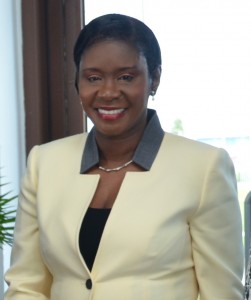
Human Services and Social Security Minister Jenifer Webster said Guyana has come a long way in mainstreaming gender equality and the empowerment of women in national policies.
According to Webster, access to productive resources including land and enhanced opportunities for political participation at all levels, including local, regional and national, is critical to addressing the inequalities faced by women, complementing and reinforcing the achievements in health and education.
Addressing the 58th session of the Commission of the Status of Women at the United Nations headquarters, New York, on the “Contribution of Women, the Young and Civil Society to the post-2015 Development Agenda” on Thursday, Webster said, “We look forward to the transition from the MDGs to the post-2015 development agenda, Guyana joins Caricom in advocating for a stand-alone goal for gender equality and the empowerment of women as well of the integration of this objective in the post-2015 agenda.”
She said it is imperative that violence against women remains a top priority in this context. It is hoped that once this is realised, the lessons of the MDGs and their implementation will provide a solid basis for the real and meaningful contribution of women and girls within our societies.
This model, she said should also be replicated for a structured framework for the participation of wider society, inclusive of the young in developmental planning, demonstrative of an inclusive approach built on ownership of the process to achieve tangible gains. The role of men and boys is important as part of a comprehensive approach to these challenges.
Steady progress
The Minister said Guyana has maintained steady progress towards achievement of the Millennium Development Goals.
“We have advanced in our efforts to reduce hunger, increase access to social services and benefits, improve enrolment in and completion of primary education, increase empowerment of women and achieve environmental sustainability. However, some of the areas that pose particular challenges include those that have a direct impact on the situation of women and children. Maternal and child mortality, though somewhat reduced, remain unacceptably high in relation to MDG targets.
Coordinated effort
In this regard, Webster said Guyana understands that it cannot achieve development objectives without resource inputs, supported by concerted and coordinated efforts by all stakeholders. By working together, the public sector, private sector and non-governmental organisations can increase effectiveness of the collective drive towards attaining sustainable development.
“A well-developed civil society widens the democratic space and provides opportunities for the participation of citizens in the political and social life by giving voice to their views and concerns. An active and informed civil society has a vital role to play in supporting enduring democracies, underpinned by good governance practices of the challenges and constraints that governments face in implementation of policies,” the minister said.
She added: My Government firmly believes that young people are the best architects for promoting their own development and solving their own problems. The inter-relatedness of education, health, labour and other social sector areas require a system for youth mainstreaming, the development of collaborative multi-sectoral strategies and the coordination and harmonisation of the efforts of the public and private sector, civil society and development partners. The challenges our youth face including high rates of unemployment, exclusion from the decision-making process and drugs and violence which impact upon security at the regional and national levels. These challenges need to be addressed in a holistic manner in the post-2015 agenda.”



